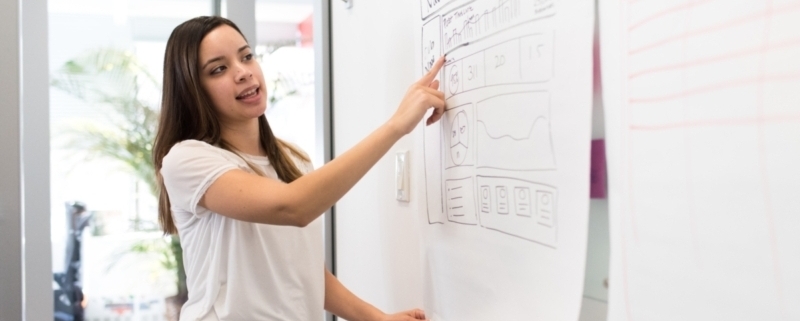Beyond COVID: Systems Change is People Change
By: May Robinson, Mission Partners Director of Community Engagement
We are nearly three months into one of the most trying times of our lives. There isn’t one aspect of our lives that COVID-19 hasn’t touched—our workplaces and the way we show up at work, for our families, our communities, and our world. COVID-19 has especially exacerbated the broken systems that exist in the United States and make it even more pertinent to center race equity in all that we do. At this point, it’s clear there’s no “going back to normal,” there’s only thinking ahead to what our future may look like.
To find some clarity during these times of great uncertainty, our CEO Carrie Fox sat down to speak with futurist Eric Meade to find out how scenarios-planning can help organizations and leaders think beyond the pandemic.
The following is a recap of our fourth community conversation hosted on May 28 titled Beyond COVID.
Lead with Principles
When we don’t know what lies ahead, crossroads decisions help us to chart a path forward. In considering the effects COVID will have on our workplaces, on our industries, and on us as leaders, we need to think about how to respond by looking internally and considering:
- What do I really care about?
- What do I want to be true in my future and in my community’s future?
Principles are what we will discover from asking ourselves those questions. Most strategic frameworks our organizations currently use lead with goals and objectives. As we’ve all experienced during COVID, goals and objectives can change as our situations change. Unlike goals and objectives, principles are timeless statements that can be applied in any potential future scenario. Principles guide leaders, who are having to find the balance between making short-term decisions based on near-term benefits vs. long-term sustainability. Leading with principles makes it possible to sustain us both in the short-term and long-term.
A Strategy for Scenarios-Planning
Scenarios-planning takes contingency-planning a layer deeper and will help us make it to the other side by tapping into our Post-Traumatic Strength instead of Post-Traumatic Stress. We are all going to feel trauma and emotions tied to this pandemic. These uncertain times cause a lot of emotions to come out, and scenarios-planning uses this energy and creates a safe space to examine our options and answer the question: What can we do now?
There are three scenarios to consider as possible futures to guide us:
- Expectable Scenario: This is the future others are predicting as the likely future based on trends.
- Desperate Scenario: This is the future with many challenges and may be the least desirable future, in which you might not overcome.
- Aspirational Scenario: You should think of two different aspirational scenarios. These are potential futures where there’s enough good beyond what people expect is possible, without being utopian.
Scenarios-planning allows you to engage with the uncertainty and consider how you might be successful in each of the possible future scenarios. You can’t predict which future is going to actually happen, so don’t focus on one possibility over the other. Allow each future to exist and think of how you might respond and move in different directions, depending on how things unfold. You might find a strategy that you’re not currently using that would work in three out of your four potential scenarios, so do it!
The Future is Only a Guide for What You Need to Do Today
If you lead with principles, the future only serves as your guide to reach your desired outcomes. If you become so obsessed with a bright future or so obsessed with a worst case scenario, you will miss things you could do right now to shape a more positive future. Plan for the future you want, but prepare for the future that you don’t. Recognize that you can’t control outcomes, but your principles can guide you through any scenario that can lead toward your desired outcomes.
Innovations Are Born in Times of Crisis
If you recall all of the times our lives and our society have transformationally improved, it is typically in times of crisis. These are the times for growth and provide a spotlight on what’s not working in our lives, in our organizations, and in our communities. These are the times that spark change toward a better future. This is a big opportunity for individuals, organizations, communities, and society to look at our past and current assumptions, behaviors, and attitudes, and make the changes necessary.
Systems Change is People Change
One of the pieces that kept returning in this conversation was the responsibility of individuals to make the changes we want to see within our organizations and communities. Change happens one person at a time. This evolved our conversation from not just what can be done within our organizations, but what can be done in our communities.
As we were engaging in this conversation of how to change systems to sustain beyond COVID, we couldn’t ignore the events that were unfolding around us in response to the racism built into these very systems. The disproportionate impacts of COVID-19 on the Black community, the unjustified murders of George Floyd, Breonna Taylor, and Ahmaud Arbery, and Amy Cooper’s racist attack all put America’s racial inequities on display for the world. During this community conversation, we recalled a recent quote from Michael Sorrell, President of Paul Quinn College: “If we really cared about equity, we would have done something about it already.”
Often when we talk about systemic failures, the humanity of the system gets stripped away. We forget that we are the system. We need to want to change enough. When people change, the systems will change.
We hold Sorrell’s quote even closer now as we realize that we have a great responsibility as business owners, community leaders, and allies. It is not enough to just speak about racial equity and center equity in our businesses. We must take bold action—in our organizations, in our communities, and as a society—to dismantle white supremacy.





 Check out our new
Check out our new